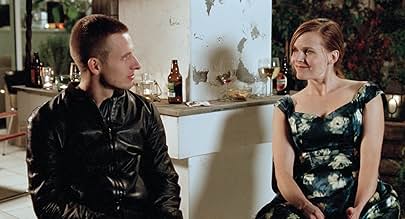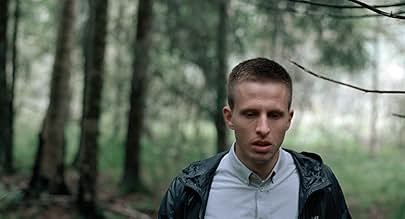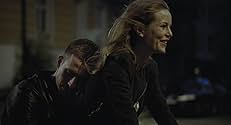PUNTUACIÓN EN IMDb
7,6/10
32 mil
TU PUNTUACIÓN
Un día en la vida de Anders, un joven adicto a las drogas en recuperación, que se toma un breve descanso de su centro de tratamiento para una entrevista de trabajo y ponerse al día con viejo... Leer todoUn día en la vida de Anders, un joven adicto a las drogas en recuperación, que se toma un breve descanso de su centro de tratamiento para una entrevista de trabajo y ponerse al día con viejos amigos en Oslo.Un día en la vida de Anders, un joven adicto a las drogas en recuperación, que se toma un breve descanso de su centro de tratamiento para una entrevista de trabajo y ponerse al día con viejos amigos en Oslo.
- Dirección
- Guión
- Reparto principal
- Premios
- 19 premios y 21 nominaciones en total
Aksel Thanke
- Terapeut
- (as Aksel M. Thanke)
Tone Beate Mostraum
- Tove
- (as Tone B. Mostraum)
Reseñas destacadas
The sober rationality of the young Norwegian intellectual classes provides a perfectly blank canvas on which to paint the conversely complex neuroses of the anti-hero, Anders. Anders is an intelligent and gifted opinionist and writer, but his addiction has left him riddled with insecurity. The film focuses on the most pivotal moment of this young man's life as he's tragically stuck between recovery and regression: that moment is both sprinkled with glimmers of hope and drenched in melancholia. Anders' contradiction is the eternal paradox of the addict, and perhaps Trier is presenting it as an allegory of the modern human condition. Anders Danielsen Lie gives an incredible performance as the enigmatic hero and the acting throughout is consistently authentic, convincing and engrossing. The soft-focus cinematography (Jakob Ihre) works well with a particularly engaging sound design which, along with very conscious direction, editing and general production design, makes for technically masterful cinema with an aesthetic that is both selectively minimal and enjoyably rich. Oslo is a tragedy. Its simple, melancholic tone and metropolitan landscapes make the film undeniably reminiscent of the French New Wave - think Hiroshima Mon Amour in present day Oslo. The film is minimal and stylized, presenting social realism in an artistic form without losing any of its dramatic potency to surrealism. Utterly convincing and captivating: an instant indie classic.
This guy gets out of rehab. One of the reasons he's been there is Oslo, but it's Oslo he returns to, when leaving.
Life is about to proceed. The lives of others, that is. The guy from rehab slowly understands that he is dead and there is no way of getting back to what he anyway never had. Oslo is merciless.
Strong drama about the hopelessness a person feels while entering middle-age knowing that he has no experiences, no history, except for the well-known feeling of being worthless. Which isn't an experience in itself. It all ends with a cliffhanger. The chasm is the possibility of getting older.
Life is about to proceed. The lives of others, that is. The guy from rehab slowly understands that he is dead and there is no way of getting back to what he anyway never had. Oslo is merciless.
Strong drama about the hopelessness a person feels while entering middle-age knowing that he has no experiences, no history, except for the well-known feeling of being worthless. Which isn't an experience in itself. It all ends with a cliffhanger. The chasm is the possibility of getting older.
'Oslo, August 31' (2011), the second film by Norwegian director Joachim Trier, is inspired by a French novel written in 1931, which was also brought to screen by Louis Malle during the Nouvelle Vague period of his career. Trier, a great admirer of this cinematic current, transplanted the story to the Norwegian capital, which is the favorite setting of his films. In fact, the film opens with an almost documentary journey through the city, with urban sequences associated with the thoughts of its permanent or temporary inhabitants. The city is the background for the lives and problems of those who live in it or pass through it, but it does not play an active role. One of the characters expresses this indifferent relationship with a phrase that can be a motto of the film: 'Society does not save those who want to self-destruct'.
The narrative structure of the film reminded me of the American TV series '24' which was very popular 15-20 years ago. Its hero, played by Kiefer Sutherland, saves the city, America or the world within 24 hours. The hero of Joachim Trier's film, Anders (Anders Danielsen Lie), tries to save himself in the entire interval between two sunrises, and the mission proves to be no less difficult. Anders is nearing the end of a detox cure that has lasted several years. The result of the treatment is fragile. Physically, drug and alcohol addiction seems to have gone away. Psychologically, however, the motivation that makes most people continue to live beyond crises has disappeared - professional ambition, emotions in relationships with women or friends. In addition, the world has moved forward, age is beginning to show signs, friends have established families, years of absence from the CV raise questions when he is trying to get a job. The 24 hours that Anders spent in Oslo, during which he tries to renew contacts with the world from which he was absent, confronts him with the indifference of the surrounding society, all the more so as it is dressed in the velvet gloves of Scandinavian politeness and civility.
'Oslo, August 31' is not a 'feel good' film but rather a 'feel bad' one - melancholic and quite depressing. It was very difficult for me to identify in any way with the hero of the film, maybe because addiction to substances, feelings like uselessness and boredom, and the morals and codes of the world of northern Europe are foreign to me. I appreciated the way 'Oslo, August 31st' is filmed and the acting, especially Anders Danielsen Lie, although I also have a doubt about that. The role in this film is so similar to the one he played in 'Reprise', Joachim Trier's debut film, that I should see another film or more in which Danielsen Lie plays something different to be convinced by the quality and depth of his talent. Joachim Trier is without a doubt a talented director, very connected to what has happened or is happening in world cinema but also very attached to the city of Oslo where the stories in all his films that I have seen so far take place. These movies fall into the category of movies that I appreciate but not of those that I love.
The narrative structure of the film reminded me of the American TV series '24' which was very popular 15-20 years ago. Its hero, played by Kiefer Sutherland, saves the city, America or the world within 24 hours. The hero of Joachim Trier's film, Anders (Anders Danielsen Lie), tries to save himself in the entire interval between two sunrises, and the mission proves to be no less difficult. Anders is nearing the end of a detox cure that has lasted several years. The result of the treatment is fragile. Physically, drug and alcohol addiction seems to have gone away. Psychologically, however, the motivation that makes most people continue to live beyond crises has disappeared - professional ambition, emotions in relationships with women or friends. In addition, the world has moved forward, age is beginning to show signs, friends have established families, years of absence from the CV raise questions when he is trying to get a job. The 24 hours that Anders spent in Oslo, during which he tries to renew contacts with the world from which he was absent, confronts him with the indifference of the surrounding society, all the more so as it is dressed in the velvet gloves of Scandinavian politeness and civility.
'Oslo, August 31' is not a 'feel good' film but rather a 'feel bad' one - melancholic and quite depressing. It was very difficult for me to identify in any way with the hero of the film, maybe because addiction to substances, feelings like uselessness and boredom, and the morals and codes of the world of northern Europe are foreign to me. I appreciated the way 'Oslo, August 31st' is filmed and the acting, especially Anders Danielsen Lie, although I also have a doubt about that. The role in this film is so similar to the one he played in 'Reprise', Joachim Trier's debut film, that I should see another film or more in which Danielsen Lie plays something different to be convinced by the quality and depth of his talent. Joachim Trier is without a doubt a talented director, very connected to what has happened or is happening in world cinema but also very attached to the city of Oslo where the stories in all his films that I have seen so far take place. These movies fall into the category of movies that I appreciate but not of those that I love.
Oslo, October 31st (2011)
A highly realistic, intimate view of a young man who has completed a drug abuse program and is trying to rejoin his life. It's a rough ride, sometimes boring, sometimes raw, but it's the real thing, and if you have an interest in this kind of common problem without watching a documentary, this is the movie.
Though set in Oslo, there is a universal quality to all of this. Yes, the leading man, Anders, has the usual problem getting jobs. But that's just the beginning. It's about friends who want to help and friends who expect him to help them be wild. It's about old girlfriends, new girlfriends, parties where you can't drink, family that wasn't adequate, and on and on.
And the temptation of real drugs, beyond drink.
It's odd to realize, but I think the bottom line is that most young people live in a culture that's on the edge, on purpose and for good reason. And there is a percentage of people who can't handle that, who need to go over the edge, and will always go over the edge. Some of those people understand it early and save themselves, others never can. And life is a series of crises.
This isn't a feel good movie about a man who succeeds (I'm not saying here if he succeeds or not—just that it's not some sunny happiness after a round with the devil). This is about what it might be like to be in the shoes of Anders, or anyone like him, and how almost impossible it is to rise up. And his friends and family are partly to blame, sad to admit.
The final few minutes of the film are poetic—elegiac might be a better word—and the opening to the film is similarly daring and edgy. It's odd and perhaps too bad the the middle—the bulk of it—is more prosaic. It's good, it's really good, but without the poetry we are sure to sink into empathy and sadness, watching what is surely so believable it is, somewhere, all too real.
A highly realistic, intimate view of a young man who has completed a drug abuse program and is trying to rejoin his life. It's a rough ride, sometimes boring, sometimes raw, but it's the real thing, and if you have an interest in this kind of common problem without watching a documentary, this is the movie.
Though set in Oslo, there is a universal quality to all of this. Yes, the leading man, Anders, has the usual problem getting jobs. But that's just the beginning. It's about friends who want to help and friends who expect him to help them be wild. It's about old girlfriends, new girlfriends, parties where you can't drink, family that wasn't adequate, and on and on.
And the temptation of real drugs, beyond drink.
It's odd to realize, but I think the bottom line is that most young people live in a culture that's on the edge, on purpose and for good reason. And there is a percentage of people who can't handle that, who need to go over the edge, and will always go over the edge. Some of those people understand it early and save themselves, others never can. And life is a series of crises.
This isn't a feel good movie about a man who succeeds (I'm not saying here if he succeeds or not—just that it's not some sunny happiness after a round with the devil). This is about what it might be like to be in the shoes of Anders, or anyone like him, and how almost impossible it is to rise up. And his friends and family are partly to blame, sad to admit.
The final few minutes of the film are poetic—elegiac might be a better word—and the opening to the film is similarly daring and edgy. It's odd and perhaps too bad the the middle—the bulk of it—is more prosaic. It's good, it's really good, but without the poetry we are sure to sink into empathy and sadness, watching what is surely so believable it is, somewhere, all too real.
I think I learned about this film when I searched for the highest rated films on Rotten Tomatoes. I saw it had earned nearly universal high marks, so I decided to check it out.
It follows a recovering addict named Anders who is granted a leave from the rehab clinic where he is currently residing to go into Oslo for a job interview. While in Oslo, which he has not visited in some time since going to the clinic, he meets a number of old friends, attempts to reconnect with a former girlfriend, and visits some old haunts.
That is essentially all in the way of plot. What makes the film so affecting are the conversations he has with these friends about life, feelings of regret, lost opportunities, etc. The conversations seemed so authentic and realistic; the writers never gave into the temptation of injecting false notes of sentimentality..
Even though Anders is an addict, this isn't really an "addiction movie." His addiction is always there in the background, but the themes that the film explores are far more universal and general. And the lead actor's performance was very poignant and impressive. I definitely recommend this to anybody interested in a strong dialog and character-driven film.
It follows a recovering addict named Anders who is granted a leave from the rehab clinic where he is currently residing to go into Oslo for a job interview. While in Oslo, which he has not visited in some time since going to the clinic, he meets a number of old friends, attempts to reconnect with a former girlfriend, and visits some old haunts.
That is essentially all in the way of plot. What makes the film so affecting are the conversations he has with these friends about life, feelings of regret, lost opportunities, etc. The conversations seemed so authentic and realistic; the writers never gave into the temptation of injecting false notes of sentimentality..
Even though Anders is an addict, this isn't really an "addiction movie." His addiction is always there in the background, but the themes that the film explores are far more universal and general. And the lead actor's performance was very poignant and impressive. I definitely recommend this to anybody interested in a strong dialog and character-driven film.
¿Sabías que...?
- CuriosidadesRenate Reinsve's feature film debut. She had two lines. She would later reunite with director Joachim Trier, as the lead in La peor persona del mundo (2021).
- PifiasAt the beginning of the film, when he dives into the lake holding a big stone, he is wearing a black jacket, when he emerges from the water he is wearing a white shirt.
- ConexionesFollowed by La peor persona del mundo (2021)
- Banda sonoraPatch To Lucy
Written by E. Skodvin/O. Totland
Performed by Deaf Center
© 2005 Type Records
Selecciones populares
Inicia sesión para calificar y añadir a tu lista para recibir recomendaciones personalizadas
- How long is Oslo, August 31st?Con tecnología de Alexa
Detalles
- Fecha de lanzamiento
- Países de origen
- Sitio oficial
- Idiomas
- Títulos en diferentes países
- Oslo, August 31st
- Localizaciones del rodaje
- Henrik Ibsens Gate 36, Oslo, Noruega(restaurant where Anders meets his sister's girlfriend)
- Empresas productoras
- Ver más compañías en los créditos en IMDbPro
Taquilla
- Recaudación en Estados Unidos y Canadá
- 101.475 US$
- Fin de semana de estreno en EE. UU. y Canadá
- 9564 US$
- 27 may 2012
- Recaudación en todo el mundo
- 1.481.665 US$
- Duración
- 1h 35min(95 min)
- Color
- Mezcla de sonido
- Relación de aspecto
- 1.85 : 1
Contribuir a esta página
Sugerir un cambio o añadir el contenido que falta


























